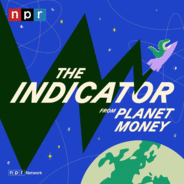We’ll never leave your messages unread. On today’s show, we open the inbox to hear from Indicator listeners about why seasoned software developers might have more AI-proof jobs, and an idea for how to improve accreditation for crime labs. Got a question, comment on a recent show or idea for an episode? Send us a message at indicator@npr.org. Related episodes: Tech layoffs, recession pop and more listener questions answered Mail bag! Grad jobs, simplified branding and central bank independence For sponsor-free episodes of The Indicator from Planet Money, subscribe to Planet Money+ via Apple Podcasts or at plus.npr.org. Fact-checking by Sierra Juarez. Music by Drop Electric. Find us: TikTok, Instagram, Facebook, Newsletter. Learn more about sponsor message choices: podcastchoices.com/adchoicesNPR Privacy Policy

Wirtschaft
The Indicator from Planet Money Folgen
A bite-sized show about big ideas. From the people who make Planet Money, The Indicator helps you make sense of what's happening in today's economy. It's a quick hit of insight into money, work, and business. Monday through Friday, in 10 minutes or less.
Folgen von The Indicator from Planet Money
300 Folgen
-
Folge vom 11.09.2025We read your mail on AI-proof jobs and how to fix crime labs
-
Folge vom 10.09.2025Can shareholders influence Elon Musk's trillion dollar pay package?Tesla’s board of directors recently proposed a pay package for CEO Elon Musk that could pay him about a trillion dollars if he meets certain goals. It’s not a done deal yet—Tesla shareholders will vote on the proposal at the company’s annual meeting in November. But just how much of a say do shareholders actually have in that decision? Or any decision?Today on the show, we look at what it takes for a shareholder to get their voice heard and how this may be changing under the Trump administration. Plus we talk to one Tesla investor agitating for changes at the company.Related episodes: An epic proxy battle comes to Hasbro Elon Musk and the fear of the activist investor Impact investing, part 1: Money, meet morals Impact investing, part 2: Can money meet morals?For sponsor-free episodes of The Indicator from Planet Money, subscribe to Planet Money+ via Apple Podcasts or at plus.npr.org. Fact-checking by Sierra Juarez. Music by Drop Electric. Find us: TikTok, Instagram, Facebook, Newsletter. Learn more about sponsor message choices: podcastchoices.com/adchoicesNPR Privacy Policy
-
Folge vom 09.09.2025The cost of saving a speciesAnimals are going extinct at an alarmingly fast rate, largely due to human activity. Same for plants. This is bad for all kinds of reasons, not least of which is that breakthrough drugs often come from nature. But there isn’t consensus on how to save these species. Part of the debate asks the economic question: with limited money going to the work, where will it have the most impact? Today on the show, the cost-effective plan to maximize biodiversity that asks ecologists to approach the question more like economists. Related episodes: The Habitat Banker The echo of the bison Savings birds with economics For sponsor-free episodes of The Indicator from Planet Money, subscribe to Planet Money+ via Apple Podcasts or at plus.npr.org. Fact-checking by Sierra Juarez. Music by Drop Electric. Find us: TikTok, Instagram, Facebook, Newsletter. Learn more about sponsor message choices: podcastchoices.com/adchoicesNPR Privacy Policy
-
Folge vom 08.09.2025Teamwork actually does make the dream workBehavioral scientist Jon Levy’s new book — Team Intelligence: How Brilliant Leaders Unlock Collective Genius — argues that, in the workplace, leadership is overrated and teamwork is underrated. Today on the show: How super chickens and NBA All-Stars demonstrate the perils of individual performance.Related episodes: Why women make great bosses The Virtual Office The Science of HoopsFor sponsor-free episodes of The Indicator from Planet Money, subscribe to Planet Money+ via Apple Podcasts or at plus.npr.org. Fact-checking by Sierra Juarez. Music by Drop Electric. Find us: TikTok, Instagram, Facebook, Newsletter. Learn more about sponsor message choices: podcastchoices.com/adchoicesNPR Privacy Policy
